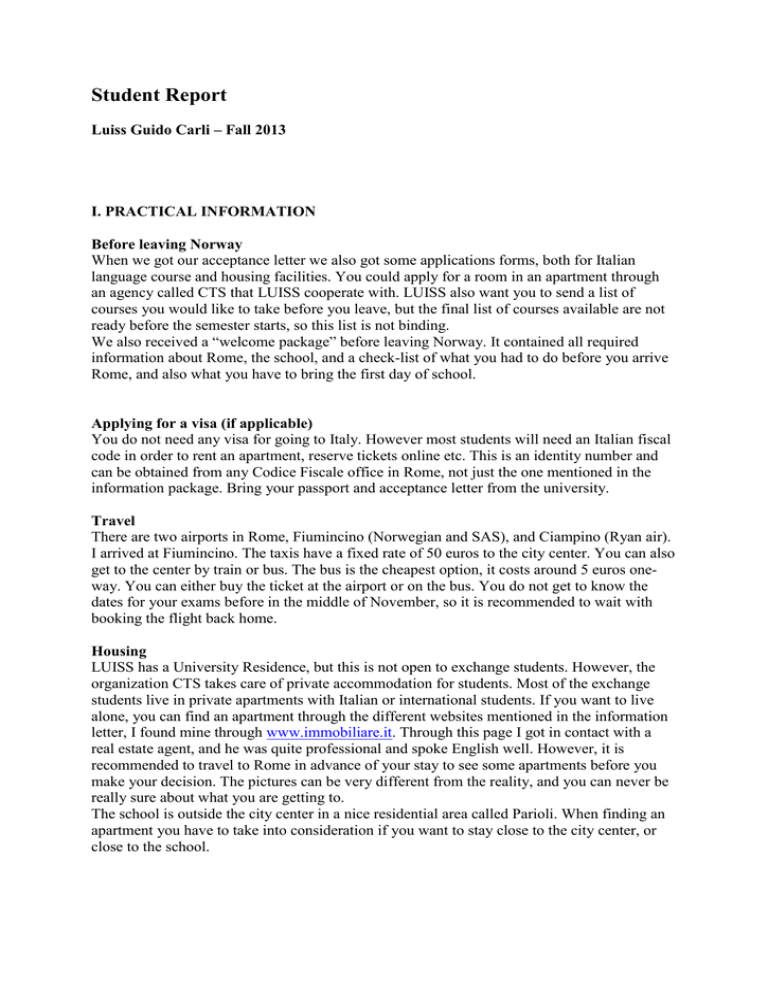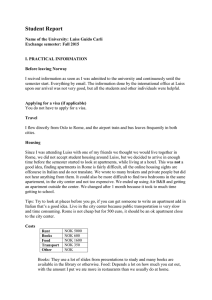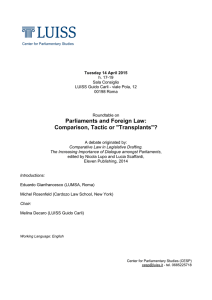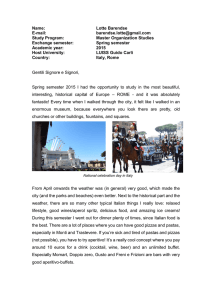Student Report
advertisement

Student Report Luiss Guido Carli – Fall 2013 I. PRACTICAL INFORMATION Before leaving Norway When we got our acceptance letter we also got some applications forms, both for Italian language course and housing facilities. You could apply for a room in an apartment through an agency called CTS that LUISS cooperate with. LUISS also want you to send a list of courses you would like to take before you leave, but the final list of courses available are not ready before the semester starts, so this list is not binding. We also received a “welcome package” before leaving Norway. It contained all required information about Rome, the school, and a check-list of what you had to do before you arrive Rome, and also what you have to bring the first day of school. Applying for a visa (if applicable) You do not need any visa for going to Italy. However most students will need an Italian fiscal code in order to rent an apartment, reserve tickets online etc. This is an identity number and can be obtained from any Codice Fiscale office in Rome, not just the one mentioned in the information package. Bring your passport and acceptance letter from the university. Travel There are two airports in Rome, Fiumincino (Norwegian and SAS), and Ciampino (Ryan air). I arrived at Fiumincino. The taxis have a fixed rate of 50 euros to the city center. You can also get to the center by train or bus. The bus is the cheapest option, it costs around 5 euros oneway. You can either buy the ticket at the airport or on the bus. You do not get to know the dates for your exams before in the middle of November, so it is recommended to wait with booking the flight back home. Housing LUISS has a University Residence, but this is not open to exchange students. However, the organization CTS takes care of private accommodation for students. Most of the exchange students live in private apartments with Italian or international students. If you want to live alone, you can find an apartment through the different websites mentioned in the information letter, I found mine through www.immobiliare.it. Through this page I got in contact with a real estate agent, and he was quite professional and spoke English well. However, it is recommended to travel to Rome in advance of your stay to see some apartments before you make your decision. The pictures can be very different from the reality, and you can never be really sure about what you are getting to. The school is outside the city center in a nice residential area called Parioli. When finding an apartment you have to take into consideration if you want to stay close to the city center, or close to the school. Costs I payed 800 euros per month in rent, but if you decide to live with other students you can find cheaper apartments. Most students pay around 500 euros. We did not buy a lot of books, most exams are based on slides and what the professor says in class. Food in the supermarket is much cheaper than in Norway, and it is also cheaper to eat at restaurants. You can buy a monthly card for public transportation that costs 35 euros. We bought an Italian sim-card from Wind, and pay 7 euros per month, that includes 300 sms, 300 minutes and 2 GB internet. Culture and language We did not have any particular language problems with the students who attended courses in English. However, most of the students at Luiss are studying in Italian and their English can be variable. We found Italian boys more eager to show of their English compared to Italian girls, who can be a bit shy of their English. The biggest language problems we faced where when we tried to get guidelines by the security guards. Some of them can’t speak a word of English. Italians are friendly and chatty people that are easy to get in touch with. They have several “ways of life” that might be new to Norwegians, but you will soon adapt and understand their culture. In particular, Italians appreciate small talk much more than Norwegians and their personal space is much smaller. Additionally, Italians have a much looser relationship with time. It is recommended and cheap to travel around in Italy, either by renting a car, or flying if the distance is further. From Rome, you can take high speed trains to other big cities like Firenze at a low cost. You can also find cheap flight tickets if you want to spend a weekend in Sicily or other places further away. II. ABOUT THE SCHOOL LUISS Guido Carli is a relatively new private school founded in 1974. They have four departments: Economic and Finance, Business and Management, Law, and Political Science. With approximately 8000 students, it is small compared to other schools in Rome. Luiss have several campuses: Economics and Social Science Campus, Law Campus and LUISS university Headquarters, where the MBA programs take place. LUISS has a good network with the business environment. They have regular guest presentations and networking, but mainly in Italian. The campuses are located in a nice are of Rome close to green areas. The buildings are historical, but due to renovation the facilities are modern. The study structure is pretty similar to that of BI. The amount of credits per course is mostly the same, also the duration of courses and number of lectures are similar. Besides some computer rooms, most of the rooms at the school are meant for lectures. Therefore it may be hard to find dedicated study place. It is not uncommon to see other students studying in class rooms between lectures. The school has few study rooms where you can study without being interrupted, but these are mostly occupied all the time. Course registration You register for courses when you start the semester by handing in an enrolment paper at the student office. You need to choose these courses after the first week, but you can register for more courses than you need and just try them out for about two weeks. After two weeks have passed you can drop courses after originally adding them to your course load. Luiss also have a system called “web-self service”, that is an online registration system where you have to register for your exams in the middle of the semester. The examination system is very different than in Norway, so make sure that you have registered for all your needed examination dates. Academic calendar Arrival date: First day of the semester: Last day of classes: Examination period: 4th of September 16th of September 7th of December 9th – 20th of December Arrival The introduction week started off with an information meeting at the school. Then we had the opportunity to sign up for a welcome week with ESN, that arranged a lot of social activities the first week and also through the semester. The week after introduction week and before the semester starts, you can sign up for an Italian crash course. This is an intensive course that lasts for a week, but I found it very good, and learned basic Italian that I could use in daily life. The International Office We were handed a comprehensive info package at the day of arrival which provided us with the information we needed. It was easy to get in touch with the International Office for additional information. Promoting BI and Norway We were not involved in a any specific activities to promote exchange in Norway. However, we spoke warmly about the possibility to other student and tried to be good ambassadors for BI and Norway. Social activities The relationship with native students was good, but we socialized mainly with other exchange student. The social environment between the exchange students was fantastic and everyone felt very included. ESN LUISS, the group for Erasmus students organized a welcome week with several interesting activities and continued to host parties and organized trips during the semester. The possibility to participate in sport activities were not great and consisted mostly of unofficial football gatherings. III. ACADEMICS In the classroom The lectures were mostly theoretical, but provided many practical examples, cases and studies. Students would go in and out of the classroom as they pleased. Talking among students during class was not uncommon, but depended on the professor. The level and workload were very similar to that of BI, but mostly a bit easier. Grading on assignments and presentations were much looser. Course materials Course materials consisted of one or two books, online articles, Powerpoint and cases. The total amount of course material was similar to that of BI, but individual importance was different. Most of the importance fell on the Powerpoint presentations. Exams Exams were mostly based on lectures, which in turn were mostly based on the Powerpoint presentations. Final exam could include forms like written, oral, home assignment, presentation, etc., there is individual differences between courses. Normally courses are a mix of an oral exam and home assignments/presentations. However, some courses only had a written exam with an optional oral exam. None of our courses had a mid-term exam, but some had in-class quizzes throughout semester. One of our courses had a several group assignments during the semester. Class attendance was mandatory on paper, but no class attendance was recorded, this really depends on your professor. Some courses encouraged to class discussion and debate, and one of our courses had a dedicated blogg were students could debate articles. The grading system is totally different than we are used to, and Luiss has a different system than the rest of Italy as well. Library and technology LUISS has a big library located in the Law Campus. The technology was pretty ordinary by Norwegian standards. Computer rooms consisted of a good amount of computers and a fast printer. Description of courses Course code & name Exam form Prerequisites Management Master/ Bachelor Bachelor Approved as Strategic course 2 hour written exam + short oral exam None Money & banking Bachelor 2 hour written exam Economic Course Luxury Management Master 2 hour written exam Basic microand macroeconomi cs None Italian language Bachelor 2 hour written None Elective Elective Comments Not challenging , relevant course. Relevant course. Good professor. Interesting, practical course with good professors from the industry. Can choose course Emerging markets exam Master 1 hour written exam Macroeconomi cs and microeconomi cs; basic notions of mathematics Elective between three different levels, not very challenging . Professor has massive amounts of knowledge, but is bad at teaching it away. On a final note, how will you sum up the exchange experience? The exchange experience has been fantastic from a cultural and social point of view. The city of Rome is a great place to spend a semester as you need a lot of time to experience it. People were very including, warm and open-minded, and we have made friends from all over the world. From an academic point of view, it has been useful to study in a country were conditions are worse than in Norway. We believe our experience will give us an advantage in our future careers.


